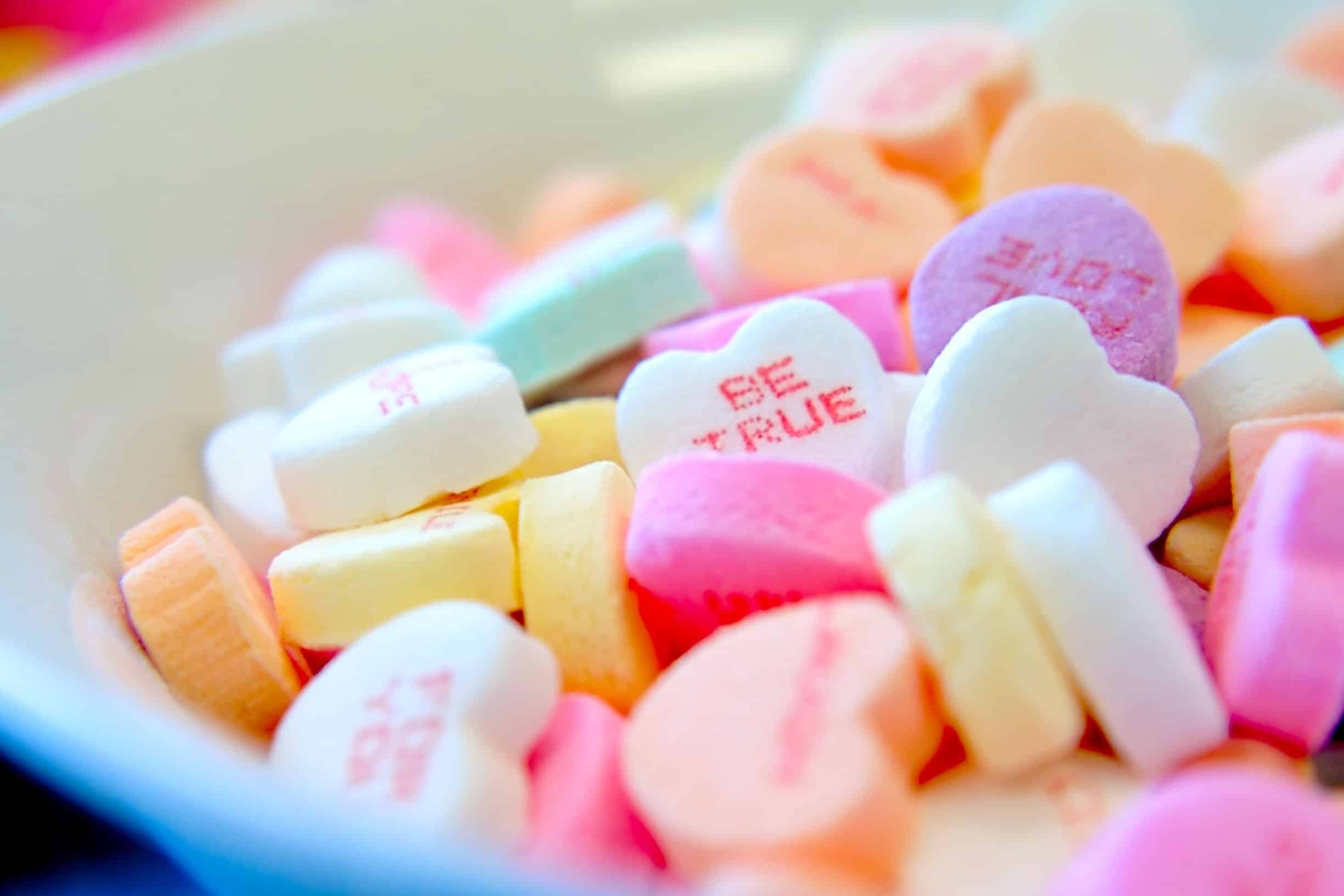Valentine’s Day Vocabulary: 120 English Words and Phrases

Valentine’s Day only comes around once a year. But the relevant vocabulary for this holiday can be used all year round.
Learn 120 Valentine’s Day vocabulary terms to help you connect with the special English speakers in your life.
Contents
Download: This blog post is available as a convenient and portable PDF that you can take anywhere. Click here to get a copy. (Download)
English Verbs for Valentine’s Day

To flirt
If you flirt with someone, you’re being playful with them because you’re attracted to them and you want to show that you like them. This could be verbally or by text or written communication, or even on social media with “likes” and comments.
Look at Rebecca flirting with Craig. It’s so obvious she likes him.
I know, she always flirts with him in math class.
To serenade
“To serenade” means to sing or play (typically romantic) music to someone as a gesture of love or affection. It’s a traditional way to express your feelings. It’s not uncommon to see singers or musicians serenading people in a restaurant on Valentine’s Day.
How was your Valentine’s Day dinner?
To admire
To admire someone means that you look up to them, respect them and in some cases love them.
You could admire your boyfriend or girlfriend (which is a stronger feeling) or you could admire your parents (respect them) because of what they’ve achieved. Some people even admire (look up to) famous people and want to be just like them.
I really admire the way you’re so nice and generous, even with strangers!
I admire my mom for everything she’s done. She’s a strong woman and has worked hard for our family.
To propose
When a person asks someone to marry them, he or she is proposing, which is short for “proposing marriage.”
There are a few other ways to refer to this action. You can say that someone “popped the question” —the question being “Will you marry me?” and the verb “pop” referring to it being a surprise.
You could also say that they “got down on one knee” (referring to the common action of kneeling with one knee on the ground to propose).
Did you hear that Mark proposed to Sarah last night at dinner?
Wow! How did he pop the question?
To adore
“To adore” means to regard someone with deep love and appreciation. It’s a sweet, poetic way to let someone know that they’re special to you. The noun for this verb is “adoration.”
I absolutely adore you and I’m so happy to have you in my life.
Here are some additional verbs that are perfect for Valentine’s Day:
Romantic Nouns in English

A flirt
A flirt is what we call a person who flirts a lot. Some people are natural flirts and just want to be playful; however, you have to be careful not to give someone the wrong impression as they may really think you’re interested in them!
Did you see Jack at the party last night?
Yeah, he’s such a flirt! He was chatting and laughing with all the girls.
Love
“Love” is actually a verb and a noun. When “like” just isn’t enough, we use “love” to express a deeper, more intense feeling. Some people write it as “luv” in text messages or when chatting online. While not technically correct, you might see it in casual environments like on social media.
I love Valentine’s Day! It’s a great opportunity to celebrate all of the love in your life.
Bouquet
A bouquet is an arrangement of flowers. It’s a common gift on Valentine’s day as well as to congratulate someone, wish them well or let them know that you’re thinking about them when they’re going through a difficult time (for example, after the death of a loved one).
What a beautiful bouquet of flowers!
I know. Pete gave them to me for our 10-year anniversary.
Secret admirer
On Valentine’s Day, it’s not uncommon to receive a card, flowers or other gift that says “from your secret admirer” instead of the name of the person it’s from. A secret admirer is a person who may be too embarrassed or shy to tell you that they like you and would prefer to remain anonymous (unknown).
Someone sent me flowers for Valentine’s Day, but the card doesn’t say who they’re from.
Oooh, exciting, you’ve got a secret admirer!
Fiancé / fiancée
A fiancé is the man someone is engaged to. If you add an extra “e” to the end, it refers to an engaged woman. These words come from the French language and are pronounced the same, so they’re often mixed up.
My parents are meeting my fiancé for the first time tomorrow. I’m so nervous!
Here are some more nouns you can use on Valentine’s Day or any time you want to turn up the romance:
Adjectives for Describing Your Feelings

Lovesick
If you’re lovesick over someone, it means you think about them all the time. You might feel some tingling in your body or a fluttering in your stomach when you see them. Unfortunately, there’s no cure for lovesickness!
I just can’t get Jason out of my head. What’s wrong with me?
Nothing, you’re just a bit lovesick. You should tell him how you feel!
Romantic
“Romantic” is an adjective that can describe pretty much anything related to love or expressing love and affection. There are romantic movies (and romantic comedies, commonly referred to as “rom coms”), romantic songs, romantic dates and more.
They had a romantic dinner in the backyard with candles and rose petals.
Heartfelt
This adjective means “sincere” or “deeply felt,” often in relation to emotions or sentiments. When an action, gesture or expression is described as “heartfelt,” it means that it comes from the heart.
She wrote me a heartfelt love letter to express her feelings.
Passionate
“Passionate” means having strong emotions, often associated with love and desire. It can also describe intense enthusiasm or devotion towards something or someone.
Their passionate kiss left no doubt about their love for each other.
Affectionate
This adjective means displaying warmth and tenderness, often through actions or words. It signifies a genuine and caring emotional connection between lovers, close friends or family members.
He’s really affectionate…he’s always hugging and kissing me or rubbing my shoulders.
If you need some more adjectives to describe all things related to love and desire, check out the list below:
Common English Phrases for Valentine’s Day

XOXO
When we sign a message with “xoxo” it means hugs and kisses. The “x’s” represent kisses and the “o’s” represent hugs. You might see different combinations of these two letters or just “x’s” for kisses.
This letter combination is only used in writing and in texts or chatting and is not typically said out loud, unless someone is reading a letter or message. It’s the iconic sign-off used by the anonymous blogger in the popular series “Gossip Girl.”
To have a crush on someone
If you have a crush on someone, it means you like them a lot and want to be more than friends with them. This is usually used between young people or when you’re attracted to a celebrity (your “celebrity crush”).
Additionally, you can say you’re “crushing on” someone. It means the same thing as having a crush on them.
It’s so obvious that you have a crush on Kelly! You always flirt with her.
Will you go out with me?
If you really like someone and want to spend more time with them, you can use this phrase to ask them out. It can refer to going out on a date, like for dinner or to see a movie, but it’s also used with younger people to refer to starting a relationship.
Hey Julie, I’d really like to get to know you better. Will you go out with me on Saturday night?
To get engaged
If you get engaged, it means that your partner asked you to marry them and you said yes (or vice versa). There’s no set time that people spend engaged before they get married. It can be just a few months or even a few years.
We got engaged a month ago, and we’re now planning our wedding for next summer.
Butterflies in your stomach
To have “butterflies in your stomach” is an idiomatic expression that means feeling nervous, anxious or excited about something. It’s characterized by a fluttery, slightly queasy sensation in the stomach, similar to the feeling of butterflies moving around.
If you like someone, you might feel butterflies in your stomach when you see or think about them.
Every time I see John I feel butterflies in my stomach. I think I really like him!
Here are some more English phrases you can use to charm your lover or compliment your friends:
These colloquial phrases can be very tricky to learn in English. To make this process easier, explore native content presented in a friendly and descriptive way.
For example, if you want to see love and Valentine’s Day vocabulary used in a natural context from film and TV, check out this video:
With this vocabulary, you can show someone how much you care about them in English!
For more romantic vocabulary and phrases, check out some English idioms about love next!
Download: This blog post is available as a convenient and portable PDF that you can take anywhere. Click here to get a copy. (Download)
And One More Thing...
If you like learning English through movies and online media, you should also check out FluentU. FluentU lets you learn English from popular talk shows, catchy music videos and funny commercials, as you can see here:
The FluentU app and website makes it really easy to watch English videos. There are captions that are interactive. That means you can tap on any word to see an image, definition, and useful examples.
For example, when you tap on the word "searching," you see this:
Learn all the vocabulary in any video with quizzes. Swipe left or right to see more examples for the word you’re learning.

FluentU helps you learn fast with useful questions and multiple examples. Learn more.
The best part? FluentU remembers the vocabulary that you’re learning. It gives you extra practice with difficult words—and reminds you when it’s time to review what you’ve learned. You have a truly personalized experience.
Start using the FluentU website on your computer or tablet or, better yet, download the FluentU app from the iTunes or Google Play store. Click here to take advantage of our current sale! (Expires at the end of this month.)










